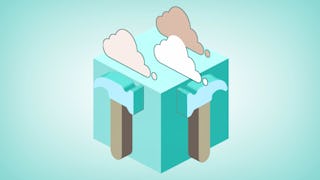Cloud computing systems today, whether open-source or used inside companies, are built using a common set of core techniques, algorithms, and design philosophies – all centered around distributed systems. Learn about such fundamental distributed computing "concepts" for cloud computing.



Cloud Computing Concepts, Part 1
This course is part of Cloud Computing Specialization

Instructor: Indranil Gupta
147,146 already enrolled
Included with 
(1,064 reviews)
Skills you'll gain
Details to know

Add to your LinkedIn profile
4 quizzes, 4 assignments
See how employees at top companies are mastering in-demand skills

Build your subject-matter expertise
- Learn new concepts from industry experts
- Gain a foundational understanding of a subject or tool
- Develop job-relevant skills with hands-on projects
- Earn a shareable career certificate


Earn a career certificate
Add this credential to your LinkedIn profile, resume, or CV
Share it on social media and in your performance review

There are 5 modules in this course
This course is oriented towards learners with similar backgrounds as juniors and seniors in a CS undergraduate curriculum. Since learners come from various backgrounds, it is critical you view this lecture AND pass the prerequisite test. This will ensure you have many of the assumed prerequisite pieces of knowledge required to enjoy this course.
What's included
16 videos8 readings1 quiz2 assignments2 discussion prompts1 plugin
Lesson 1: This module teaches how the multicast problem is solved by using epidemic/gossip protocols. It also teaches analysis of such protocols. Lesson 2: This module covers the design of failure detectors, a key component in any distributed system. Membership protocols, which use failure detectors as components, are also covered. Lesson 3: This module covers Grid computing, an important precursor to cloud computing.
What's included
14 videos2 readings1 quiz1 discussion prompt
P2P systems: This module teaches the detailed design of two classes of peer to peer systems: (a) popular ones including Napster, Gnutella, FastTrack, and BitTorrent; and (b) efficient ones including distributed hash tables (Chord, Pastry, and Kelips). Besides focusing on design, the module also analyzes these systems in detail.
What's included
10 videos2 readings1 quiz1 discussion prompt
Lesson 1: This module motivates and teaches the design of key-value/NoSQL storage/database systems. We cover the design of two major industry systems: Apache Cassandra and HBase. We also cover the famous CAP theorem. Lesson 2: Distributed systems are asynchronous, which makes clocks at different machines hard to synchronize. This module first covers various clock synchronization algorithms, and then covers ways of tagging events with causal timestamps that avoid synchronizing clocks. These classical algorithms were invented decades ago, yet are used widely in today’s cloud systems.
What's included
12 videos3 readings1 assignment1 discussion prompt
Lesson 1: This module covers how to calculate a distributed snapshot, leveraging causality again to circumvent the synchronization problem. Lesson 2: This lecture teaches how to order multicasts in any distributed system. Algorithms for assigning timestamp tags to multicasts using various flavors of ordering – FIFO, Causal, and Total – are covered. The module also covers virtual synchrony, a paradigm that combines reliable multicasts with membership views. Lesson 3: Consensus is one of the most important problems in a distributed system, enabling multiple machines to agree. This module uses Paxos, one of the most popular consensus solutions used in the industry today. Paxos is not perfect because consensus cannot be solved completely – an optional lecture presents the famous FLP proof of impossibility of consensus.
What's included
16 videos4 readings1 quiz1 assignment1 programming assignment3 discussion prompts1 plugin
Instructor

Offered by
Recommended if you're interested in Algorithms


University of Illinois Urbana-Champaign


University of Illinois Urbana-Champaign


University of Illinois Urbana-Champaign
Why people choose Coursera for their career




Learner reviews
1,064 reviews
- 5 stars
63.81%
- 4 stars
21.52%
- 3 stars
6.01%
- 2 stars
2.72%
- 1 star
5.92%
Showing 3 of 1064
Reviewed on Dec 23, 2017
Enjoyed the course. Brought back my ability to program in c++. The programming assignment was sufficiently challenging to achieve that.
Reviewed on Jun 8, 2018
Liked the course very much. Only suggestion is if the speaker could speak a little slower. This will allow the listener to think alongside.
Reviewed on Dec 5, 2016
Great lectures. However, the starter code for the programming assignment is quite atrocious. Overall, would highly recommend to anyone wanting to learn high level concepts in distributed systems.
New to Algorithms? Start here.

Open new doors with Coursera Plus
Unlimited access to 10,000+ world-class courses, hands-on projects, and job-ready certificate programs - all included in your subscription
Advance your career with an online degree
Earn a degree from world-class universities - 100% online
Join over 3,400 global companies that choose Coursera for Business
Upskill your employees to excel in the digital economy
Frequently asked questions
Access to lectures and assignments depends on your type of enrollment. If you take a course in audit mode, you will be able to see most course materials for free. To access graded assignments and to earn a Certificate, you will need to purchase the Certificate experience, during or after your audit. If you don't see the audit option:
The course may not offer an audit option. You can try a Free Trial instead, or apply for Financial Aid.
The course may offer 'Full Course, No Certificate' instead. This option lets you see all course materials, submit required assessments, and get a final grade. This also means that you will not be able to purchase a Certificate experience.
When you enroll in the course, you get access to all of the courses in the Specialization, and you earn a certificate when you complete the work. Your electronic Certificate will be added to your Accomplishments page - from there, you can print your Certificate or add it to your LinkedIn profile. If you only want to read and view the course content, you can audit the course for free.
If you subscribed, you get a 7-day free trial during which you can cancel at no penalty. After that, we don’t give refunds, but you can cancel your subscription at any time. See our full refund policy.
More questions
Financial aid available,



